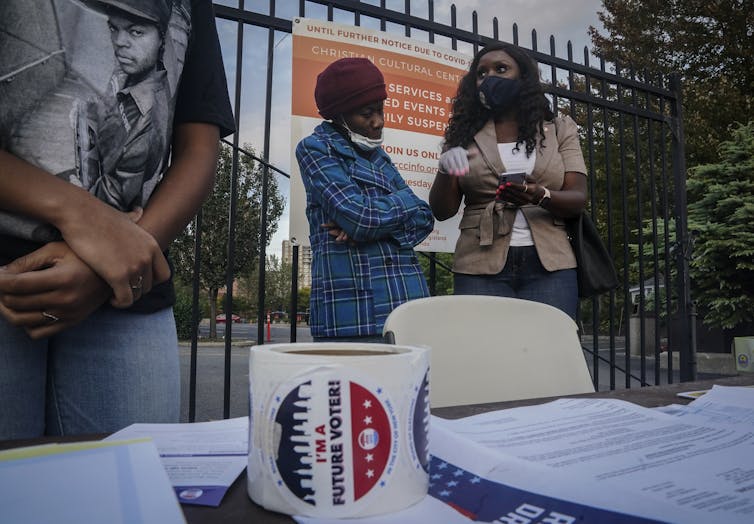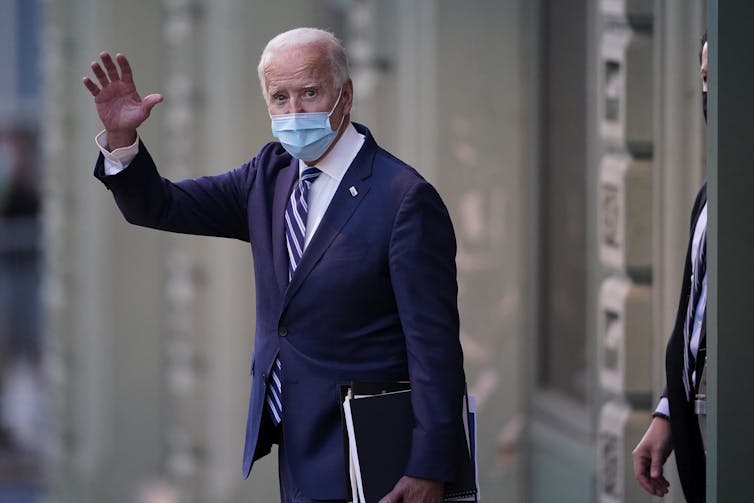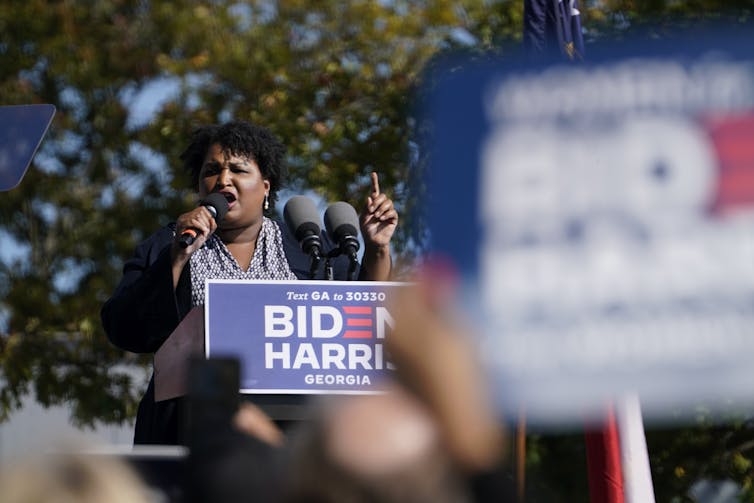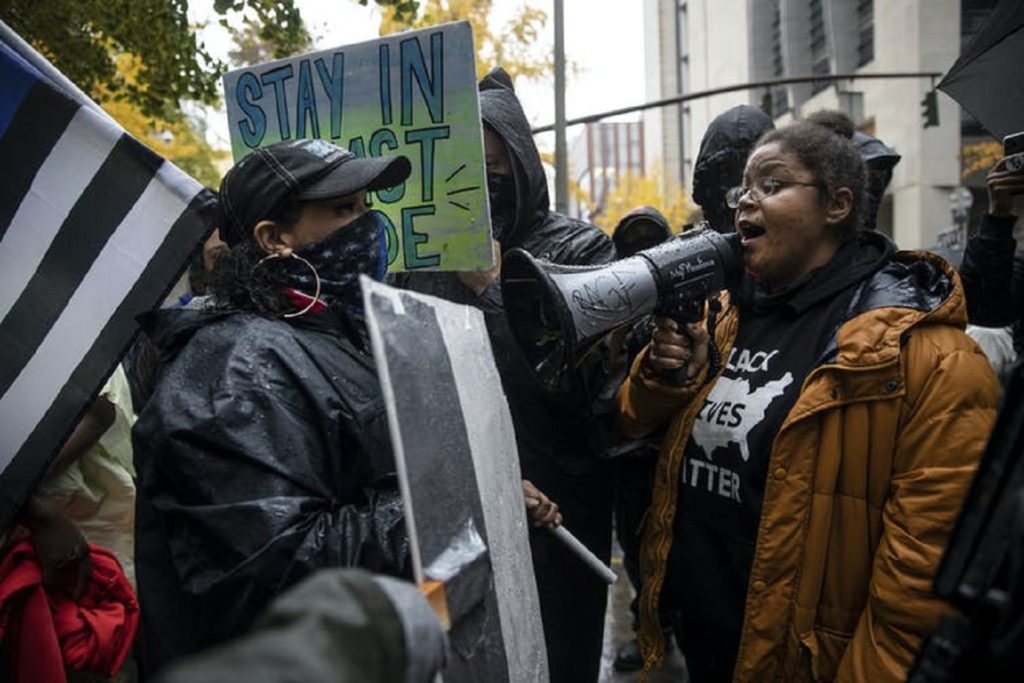African American women will play a major role in progressing the Black Lives Matter movement, as the United States transitions to a new Biden Administration, writes Clare Corbould, from Deakin University in this piece republished from The Conversation.
During the northern summer, anti-Trump sentiment fused with anti-racist activism in the US, causing huge numbers of Americans to protest all around the country.
President Donald Trump has been voted out of office, but the issues at the heart of Black Lives Matter remain as critical as ever.
In fact, the high turnout for both sides in the election demonstrates two things: the power of the movement and the need for it to continue.
But where does Black Lives Matter go from here?
Decentralised organisation is key
If you can’t name the three Black women — Alicia Garza, Patrisse Cullors and Opal Tometi — who coined the phrase “Black Lives Matter” in 2013, there’s a good reason for that.
Seeking to avoid what they saw as the mistakes of the Civil Rights Movement, they stayed low-key and used social media to facilitate local activists taking responsibility.
The 2020 US election has decisively demonstrated the power of this strategy, because it took varied local organisations to activate important pockets of Black voters, Latino voters, and young voters.
During the summer’s large protests, hundreds of thousands of people registered to vote, including a surge in Black voter registration.

Activists learned their tactics from a long tradition. Decentralised organisation, often led by women, has always been integral to African Americans’ campaigns for rights. The Civil Rights Movement succeeded because of the work of women such as Ella Baker and Fannie Lou Hamer, which culminated in the 1965 Voting Rights Act.
But in 2013, a conservative-leaning Supreme Court ruled sections of the Voting Rights Act were unconstitutional. Nine states — including seven in the south, where voting had been closely supervised by the federal Department of Justice — were now able to limit the franchise.
In other words, those in power could resume discriminating against voters. So too could other states, now the threat of having such supervision imposed was removed. Voter suppression efforts, which were already a problem, have abounded since.
Black women lead the charge
African American women were the backbone of the Democratic Party’s 2020 electoral success.
Along with Kamala Harris successfully running for vice president, some 130 Black women ran for Congress — with almost 100 on the Democratic side.
Democratic politician and activist, Stacey Abrams, also led a new organisation, Fair Fight. Together with other organisers, it made Georgia a swing state by registering roughly one million additional voters since 2016. Nearly two-thirds are voters of colour.
In Atlanta and cities elsewhere, such as Detroit and Milwaukee, Black voters registered and turned out.
Not all African American voters favoured Democratic candidates, of course, but the proportion was high enough to deliver key states to the party. Importantly, the proportion of Black women who voted for Trump was small and, in Georgia for example, it was under half that of Black men.
Success beyond the election
The Black Lives Matter movement is much more expansive in its aims than either defeating Trump or putting a Democratic president in the White House.
Joe Biden has heeded those aims, noting during the campaign and in his first speech as president-elect that one of the nation’s major challenges is “systemic racism.”

Surveys this year have also shown unprecedented sympathy for Black Lives Matter causes among white Americans. While support has fallen in the months since protests following George Floyd’s death in May, unexpected groups of white people have demonstrated a concerted commitment to protesting.
Movement’s strength also brings out Republican vote
The record-breaking turnout for Trump, especially given the appalling failure to manage the COVID crisis, suggests the successes of Black Lives Matter have also generated a parallel backlash.
Trump certainly used the visibility of the protests to anchor his campaign around anti-Black Lives Matter rhetoric and sentiment. He tweeted “LAW AND ORDER!” many times, in his trademark all caps. When asked in the presidential debates about racism and racial inequality, he pivoted to this theme.
Trump also railed against “critical race theory” and teaching history in schools that focused too heavily on racism.
Republicans joined Trump in attempting to frighten voters, by claiming Biden would heed the vision of Black Lives Matter activists to defund and abolish the police.
More than 70 million voters seem to have been persuaded or at least not dissuaded by Trump and Republicans’ racist dog-whistling.
Much more work to do
Anti-racist organisers knew long before Biden was even picked as the Democratic candidate it wouldn’t matter who won the White House, because true change comes only from grassroots activity.
The mission will be helped if the broad anti-racist coalition that seemed to emerge mid-year can be sustained, even without the galvanising presence of Trump in the White House.

In electoral terms, all eyes now move to Georgia, where it is likely that two “run-off” ballots will determine the balance of the federal Senate.
The boost to Abrams’ profile in the past week will be a boon for fundraising. Black Lives Matter organisers and Democrats will hope national attention also brings out reluctant voters and sustains the interest of first-time voters.
By the same token, Republicans will hope their own successful “All Lives Matter” rhetoric and tactics can provide sufficient ballast to win the two seats and retain control of the Senate.
In the medium-term, activists nationwide will continue to work to mitigate the varied forms of voter suppression, because these disproportionately affect voters of colour. The apparent closeness of the presidential election — a mirage produced by Republican state legislatures’ decision not to count mail-in ballots until election day — drew a great deal of attention to this widespread disenfranchisement.
The long-term targets of Black Lives Matter activists are harder to pinpoint. But they include police violence, incarceration levels, and the many other injustices that stem from systemic racism, whether in the United States or other countries, including Australia.
In all arenas, the dispersed nature of the organising and the key role played by African American women will remain absolutely vital.
Clare Corbould, Associate Professor, Contemporary Histories Research Group, Deakin University
This article is republished from The Conversation under a Creative Commons license. Read the original article.


